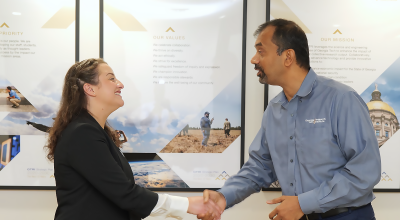
The Georgia Tech Research Institute (GTRI) has expanded its Defense-university Affiliated Research Traineeship (DART) Program to Tuskegee University, a historically Black university in Tuskegee, Alabama.
GTRI launched the DART Program as a pilot in 2023 in partnership with the U.S. Army Development Command (DEVCOM) Aviation & Missile Center (AvMC) and Alabama A&M University (AAMU), both located in Huntsville, Alabama. The collaboration continued in 2024. In the just-ended cycle, GTRI hosted a faculty member and undergraduate student at both universities, who spent 10 weeks conducting research for DEVCOM Armaments Center (AC) and DEVCOM AvMC. During the program, participants were able to visit their research sponsor, DEVCOM AC, Picatinny Arsenal in New Jersey, which provided the DART projects and learning opportunities.
Historically Black Colleges and Universities (HBCUs), contribute nearly $17 billion to the U.S. economy each year and produce one-fourth of all Black graduates with critical degrees in Science, Technology, Engineering, and Math (STEM). But funding challenges prevent many HBCUs from providing the necessary infrastructure to perform impactful Department of Defense (DoD) applied research, which often requires access to and safeguarding of sensitive project information.
GTRI, with its 90-year research heritage and DoD University Affiliated Research Center (UARC) status, is addressing this challenge through the DART Program. GTRI’s UARC and DART Program sponsor, DEVCOM AvMC, is focused on exposing HBCU STEM students, faculty and researchers to challenging DoD applied research and development (R&D) projects, explained Lee Simonetta, a GTRI principal research engineer and DART program director.
“At its core, DART provides training and mentorship for HBCU faculty and students to engage in applied research projects for the DoD that are cost, schedule and performance-sensitive,” Simonetta said.
DART also exposes HBCU faculty and students to potential DoD career opportunities.
“It opens their eyes to how rewarding and impactful DoD research opportunities can be,” he added.

The DART Program’s Tuskegee University researchers were Dr. Yasmeen Rawajfih, an associate professor of computer science, and James Dix, a fourth-year computer science student. AAMU DART Program participants were Dr. Alakananda (Alak) Bandyopadhyay, a computer science professor, and Riley Roberts, a third-year computer science major.
Tuskegee’s research project involved designing solutions to improve DEVCOM AC’s current software development process, which is crucial to ensuring mission-critical weapon systems are reliable, secure and compliant with DoD regulations and capable of mitigating risks while maintaining efficiency in large-scale projects. The project focused on creating a more fundamental process and set of guidelines to help teams tailor and determine which metrics and measures were most relevant to their specific projects.
“The goal is to build better software efficiently while maintaining control over the entire process to ensure a high-quality product,” said Simonetta. “This also includes thoroughly addressing all security aspects from start to finish.”
AAMU developed an algorithm to enhance the effectiveness of DEVCOM AC’s drone swarm program. Swarms are a group of drones that operate together as a coordinated system, with one drone acting as the leader to direct the group’s command, control and tasking.
If the leader drone becomes disabled, crashes, is shot down or goes down due to technical issues, the algorithm would ensure that a new swarm leader is quickly elected to maintain command and control and ultimately mission success.
“If the leader crashes, you need to quickly and simply select a new leader, otherwise the swarm won't be able to do what it needs to do,” said Roberts. “We used what's called a min-heap algorithm, which sorted each drone by ID number. We used those ID numbers to identify the drone with the smallest ID, or highest priority, and placed it at the top of the array.”
Min-heaps are commonly used to implement priority queues, where the item with the highest priority, or smallest value, is always accessed first. Organizing the drones' IDs in a min-heap ensures that the best candidate for leadership is easily accessible, maintaining the fleet's operational continuity.
Dr. Alak, who has expertise in algorithms and numerical methods, noted that the DoD had no such algorithm in place, which required him and Roberts to work quickly to create one from scratch. Dr. Alak has been a professor at AAMU for 20 years and holds a Ph.D. in mechanical engineering with a focus on computational fluid dynamics from the University of Minnesota.
“This project gave us the opportunity to contribute to an interesting initiative, even though we started with no prior knowledge,” Dr. Alak said. “However, in a short amount of time, we were able to learn the material and come up with a solution.”
Dr. Alak applauded DART for giving young talent the chance to gain applied knowledge beyond theories and concepts that are taught in the classroom and to develop relationships within the DoD.
Roberts, who has returned to GTRI to work as a student researcher during the 2024-2025 school year, called the trip to Picatinny Arsenal “impactful” as it helped bring his research project to life.
“It was really cool to see where our sponsor works and the drones that would benefit from our algorithm,” Roberts said. “It’s one thing to say, ‘Okay, yeah, we're working on this project for this sponsor,’ but seeing how our work will actually be used gave me a better sense of how everything fits together.”

GTRI Senior Research Engineer Russell Ivey, who is based out of GTRI’s Huntsville Research Center (HRC), served as the on-site coordinator for the 2024 DART program.
Noting the hurdles that exist for HBCUs in the defense space, Ivey said DART gave him the opportunity to broaden participants’ horizons to the applied research done at GTRI, while also providing project support and mentorship.
“It's great to be able to take the experience that you've had and distill it to someone else to give them new opportunities,” Ivey said.
GTRI plans to expand DART to a third HBCU in 2025.
Writer: Anna Akins
Photo Credit: Riley Roberts
GTRI Communications
Georgia Tech Research Institute
Atlanta, Georgia
The Georgia Tech Research Institute (GTRI) is the nonprofit, applied research division of the Georgia Institute of Technology (Georgia Tech). Founded in 1934 as the Engineering Experiment Station, GTRI has grown to more than 2,900 employees, supporting eight laboratories in over 20 locations around the country and performing more than $940 million of problem-solving research annually for government and industry. GTRI's renowned researchers combine science, engineering, economics, policy, and technical expertise to solve complex problems for the U.S. federal government, state, and industry.




